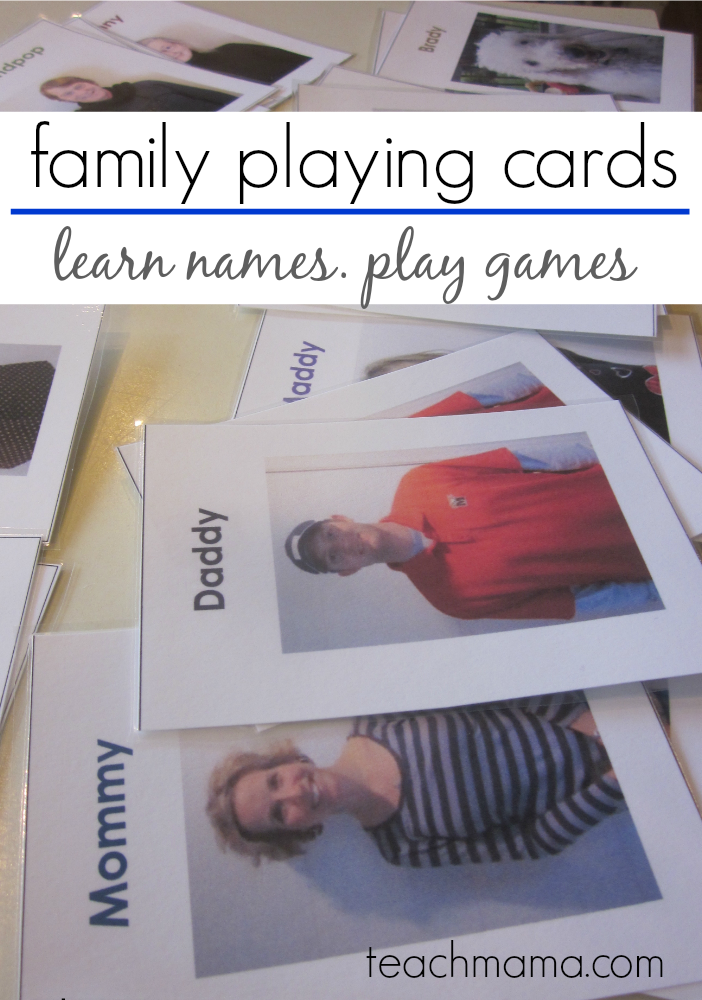Παρασκευή 22 Μαΐου 2015
Τετάρτη 20 Μαΐου 2015
ΟΜΑΔΑ ΝΗΠΙΑΓΩΓΩΝ: ΠΡΟΣΧΟΛΙΚΗ ΕΚΠΑΙΔΕΥΣΗ ΚΑΙ ΕΙΔΙΚΗ ΑΓΩΓΗ

Στην
προσχολική εκπαίδευση είναι πολλά και πολύπλευρα τα προβλήματα που εγείρονται
από έλλειψη αναγνώρισης της βαθμίδας ως ισότιμης με
τις υπόλοιπες. Πολλές φορές έχουν αναφερθεί προβλήματα όπως τα άθλια και
ακατάλληλα κτίρια που στεγάζουν παιδιά 4-6 ετών. Η σημαντική έλλειψη
υλικοτεχνικής υποδομής, η ελλιπής μέριμνα για ουσιαστική και με στοχοθεσία σε
βάθος χρόνου επιμόρφωση, ο υποβαθμισμένος ρόλος της/του νηπιαγωγού που πολλές
φορές συνδέεται η νοημοσύνη και η ικανότητα των εκπαιδευτικών με την ηλικιακή
ομάδα που διδάσκουν και άλλα πολλά.
Κυριακή 3 Μαΐου 2015
Family Playing Cards: take ‘em, make ‘em, then play!

A few years ago, I burned the midnight oil way too close to the finish line, in an attempt to create Family Playing Cards for Maddy, Owen, and Cora.
And though I made the work harder than it needed to be, it was well worth it.
The kids have used the cards steadily for the last two years, playing games, using them as ‘cheaters’ when they made cards, wrote notes, and developed stories with their family as the main characters.
This year, I utilized my sweet, sweet laptop a little more–and I called in the resources of a good pal–so my work was a little easier.So with a little help from my friends, I created family playing cards for my kiddos, adding new cousins and Brady.
But I also made a set for our niece and nephews, and I’m hoping that they have as much fun learning our names as we have had learning theirs.
Phonemic Activities for the Preschool or Elementary Classroom
By: Marilyn J. Adams, Barbara Foorman, Ingvar Lundberg, and Terri Beeler (2004)
This article features activities designed to stimulate the development of phonemic awareness in preschool and elementary school children. The activities originally appeared in the book Phonemic Awareness in Young Children: A Classroom Curriculum.
Listening to sequences of sounds
From chapter 3: Listening games
Objective
To develop the memory and attentional abilities for thinking about sequences of sounds and the language for discussing them.
Materials needed
Objects that make interesting, distinctive sounds. Some examples follow:
banging on wall/table/lap
blowing blowing a whistle blowing nose clapping clicking with tongue closing purse coloring hard on paper coughing crumpling paper cutting with a knife cutting with scissors dropping (various things) drumming with fingers eating an apple folding paper hammering hopping noisy chewing |
opening window or drawer
pouring liquid ringing a bell rubbing hands together scratching sharpening a pencil slamming a book smashing crackers snapping fingers stamping stirring with teaspoon tearing paper tiptoeing turning on computer walking whistling writing on board writing with a pencil |
Δευτέρα 20 Απριλίου 2015
Ομάδα Νηπιαγωγών « Δικαίωμα στην εκπαίδευση»: Ημερίδα στο Βόλο
 Η Ομάδα Νηπιαγωγών "Δικαίωμα στην Εκπαίδευση" συνεχίζει τις δράσεις της
ενισχύοντας τις συνδικαλιστικές διεκδικήσεις με επιστημονική τεκμηρίωση.
Η Ομάδα Νηπιαγωγών "Δικαίωμα στην Εκπαίδευση" συνεχίζει τις δράσεις της
ενισχύοντας τις συνδικαλιστικές διεκδικήσεις με επιστημονική τεκμηρίωση.
Αφουγκραζόμαστε
και καταγράφουμε τις ανησυχίες και τους προβληματισμούς των συναδέλφων και
επικαιροποιούμε τα αιτήματά μας.
Καταθέτουμε το προσωπικό μας όραμα για το νηπιαγωγείο της συμμετοχής,
της συνεργασίας, των υποδομών, της αξιοκρατίας, της αναβάθμισης της διδασκαλίας
με σύγχρονα μέσα, της διαρκούς επιμόρφωσης, της αναβάθμισης του ρόλου του
νηπιαγωγού και αγωνιζόμαστε γι΄ αυτό.
Πέμπτη 26 Μαρτίου 2015
Πέμπτη 12 Μαρτίου 2015
Εγγραφή σε:
Σχόλια (Atom)




